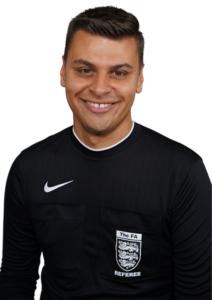Stress is a direct result of a referee focusing on, and trying to control the “uncontrolables” within their officiating, such as play of teams, conditions, crowd, etc.). When a referee focuses on these uncontrollables they are more likely to tighten up and “freeze.” Here are some brief guidelines to follow to help you to better manage stress on the field of play.
Step One
Consider The Process, Not The Outcome – When an official focuses on the importance of the game, what it means to others, or anything to do with the outcome of the performance, they are in big trouble. This focus distracts the referee from a performance focus, tightens them up physically and insures that body language will be tight and tentative. Focus on specifically what you have to do to win, not on the occasion.
Step Two
Having An Awareness Of The Stress/Performance Curve – By understanding the relationship between your level of nervousness and how well you perform, you will take a major step towards being able to better handle pressure. If you’re able to “read” your nervousness pre=performance and can tell the difference between “good”, “bad”, and “not enough” nervous, then you’ll will be in a better position to be able to do something about your arousal level before it’s too late.
Step Three
Develop Coping Skills Rather Than Just Telling Yourself To “Relax” – Spend a small amount of time seeking out a number of mental skills that you can use to help you to better relax under pressure. Not all referees will need these, but you’ll do far more good than not by investing a small amount of practice time on 2-3 relaxation techniques (progressive muscle relaxation, autogenic training, breathing exercises, etc.). Armed with ways of cooling down, you’ll be less likely to fall apart under stress.
Step Four
Consider Reframing – Reframing adversity teaches you how to use whatever adversity comes your way to boost confidence rather than erode it. Try to see that poor weather conditions, mistakes from players, unsporting conduct, fatigue, etc., can work for you. There is always an advantage in a disadvantage. Train yourself to find it.
Step Five
Use Humour – The surest way to get yourself to tighten up and referee poorly is by being too serious. Peak performance comes out of having fun. You officiate to your very best level when you are enjoying the challenge; regardless of the level. It is important to keep everything in perspective and perform as well as possible. A referee that is too serious is an official who has a tendency to freeze under pressure.
Step Six
Take Perspective – If you make the fixture “bigger than life” your performances will suffer. If the game is built up too much, or if that “must be perfect” situation becomes too important, then chances are you will not perform well. An official that freezes usually has lost their perspective and made the match much too important.
Step Seven
Simulate Matchday – Practice does not make perfect, perfect practice makes perfect. It’s the quality of your training sessions that is ultimately responsible for how much you get from training and how well you handle highly pressured situations. Integrate matchday elements into your sessions to help you better adjust to the actual pressure of game day. The more your training resembles fixtures, the less chance you will have of falling apart under pressure. If you have trouble with making bad decisions, certain playing conditions, etc., simulate these elements as closely as possible in your practices.
Step Eight
Go For It – In training create an atmosphere of “nothing to lose” or “free to fail”. When you aren’t concerned about making mistakes you can perform to your best. If you are worrying about messing up you’ll be distracted enough and tight enough to indeed mess up. Encourage yourself to let your mistakes go immediately and to focus on what they want to have happen, not what they are afraid will happen. Reward mistakes when you’ve truly gone for it, when you’ve given a excellent effort. If you can become oblivious to failure and mistakes (i.e., learn from them and that they are useful only for feedback on how to improve), then they will perform well for you.
Step Nine
Separate Self-Worth From Performance At every level, referees get stressed out when they attach their self worth to the quality of their performance (i.e., “I officiated well so therefore I am successful”, “I was awful and therefore I am a not a good person”). Do not make the mistake of equating your performance with how you feel about yourself. If your ego is on the line every time you referee you have a lot to lose. When you officiate with a lot to lose, you will most likely get stressed out and referee poorly.
Step Ten
Challenge Yourself, Don’t Threaten – When you’re threatened with consequences should you not perform well, you’ll consistently fall apart when the pressure is on. Threats only serve to distract you from the task at hand and lead you to worry about the consequences for failure. Focusing on the “what if’s” of failing is the last thing you want to do before and during an important game. Instead, challenge yourself. Tell yourself that you think that you can do it, that you believe in yourself. Referees will most frequently rise to challenges and respond poorly or inconsistently to threats.
Step Eleven
Focus For Peak Performance Under Pressure – Most stress related performance problems are a direct result of faulty concentration. Referees that get easily psyched out or intimidated do so because they are focusing on the wrong things (i.e., the actual or imagined prowess of the colleagues). Concentrate on specifically what you have to do to officiate well. Teach yourself to “control your eyes and ears”, to only look at, or listen to things that keep you composed and performing at your best.
At The Third Team I work individually and in collaboration with different professionals where I have developed workshops and 1-2-1 sessions associated with Resilience and Mental Toughness Development to help referees. The workshops and 1-2-1 sessions are interactive, where referees are encouraged to open up and share their experiences to help themselves and each other.
Feel free to contact me if you’d like to know more about my workshops or 1-2-1 sessions and how I could help you or your officials.
Best Wishes,

Nathan Sherratt
Referee Educator & Managing Director of The Third Team

Nathan Sherratt
Nathan Sherratt, Referee Educator, Resilience Trainer and Managing Director of The Third Team. A Mental Toughness Practitioner based in Tyne & Wear, North East England.

